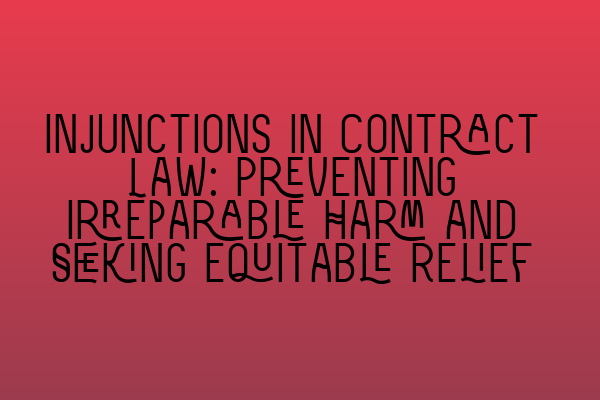Injunctions in Contract Law: Preventing Irreparable Harm and Seeking Equitable Relief
Welcome to SQE Contract Law, where we provide expert legal advice and guidance on a wide range of contract law matters. In this blog post, we will delve into the fascinating world of injunctions in contract law, exploring how they can be used to prevent irreparable harm and seek equitable relief.
What is an Injunction?
An injunction is a court order that requires a party to either do something or refrain from doing something. In the context of contract law, an injunction can be sought by one party to the contract as a remedy for a breach or potential breach of the contract by the other party. It is a powerful legal tool that aims to prevent irreparable harm and achieve a fair and just outcome.
Types of Injunctions in Contract Law
There are two main types of injunctions commonly used in contract law:
- Prohibitory Injunction: This type of injunction restricts a party from taking certain actions or continuing with a particular course of conduct. It aims to prevent the breaching party from causing further harm or damage.
- Mandatory Injunction: This type of injunction requires a party to perform a specific action or fulfill an obligation under the contract. It is sought when monetary damages alone are insufficient to provide an adequate remedy.
Both types of injunctions serve the purpose of maintaining the status quo, preserving the rights of the non-breaching party, and preventing any further harm or loss.
When Can an Injunction be Granted?
An injunction can be granted by the court if certain conditions are met:
- Irreparable Harm: The non-breaching party must demonstrate that they will suffer irreparable harm if the injunction is not granted. This means that the harm cannot be adequately compensated through monetary damages alone.
- Likelihood of Success: The non-breaching party must establish a strong likelihood of success in proving the breach of contract. They must present sufficient evidence to convince the court that their claim is valid.
- Balance of Convenience: The court will consider the balance of convenience between the parties. This involves weighing the potential harm to both parties and determining which party would suffer more if the injunction is granted or denied.
If these conditions are met, the court may grant an injunction to protect the rights and interests of the non-breaching party.
The Importance of Seeking Equitable Relief
Injunctions play a crucial role in contract law as they provide equitable relief to the injured party. Equitable relief aims to restore the injured party to the position they would have been in if the breach had not occurred. This is often not achievable through monetary compensation alone.
By seeking an injunction, the non-breaching party can obtain timely and effective relief, preventing further harm and securing their rights under the contract. It is a proactive approach to resolving contractual disputes and maintaining contractual stability.
If you are facing a breach of contract or believe that an injunction may be necessary to protect your interests, our team of experienced solicitors at SQE Contract Law can provide you with expert advice and guide you through the legal process.
Conclusion
Injunctions in contract law are powerful legal remedies that can prevent irreparable harm and seek equitable relief for the non-breaching party. They play a crucial role in maintaining contractual stability and ensuring fair and just outcomes. If you require assistance with any contract law matter, do not hesitate to contact SQE Contract Law for expert advice and guidance.
Related Articles:
